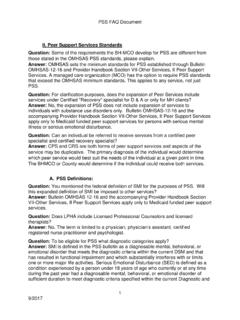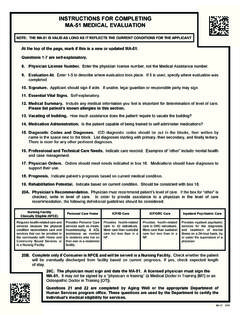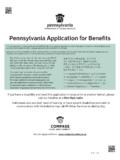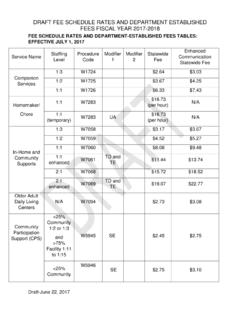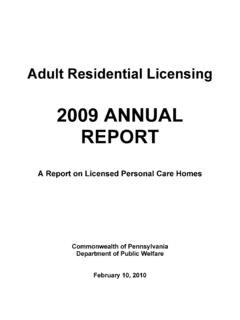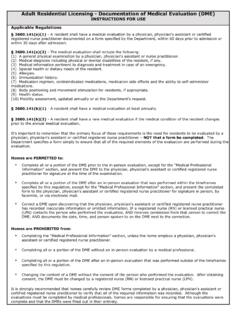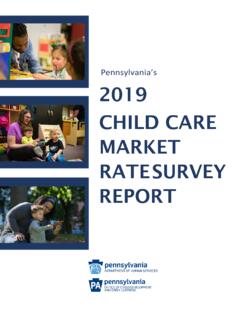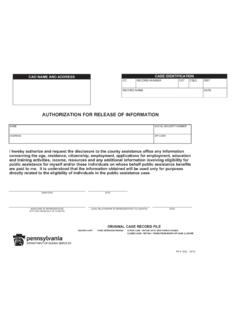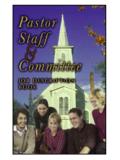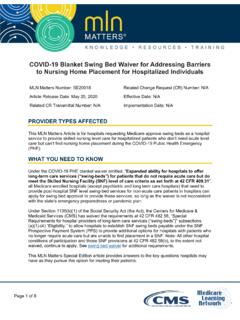Transcription of Special Needs Trust Fact Sheet - Department of Human Services
1 Special Needs Trust FACT AND INFORMATION Sheet Special Needs Trust (SNT) An SNT is established with the resources of a disabled individual for the purpose of allowing the individual to qualify for Medical Assistance (MA). A Trust beneficiary must be under the age of 65 when the SNT is established and there can be no additions to the Trust after the Trust beneficiary turns age 65. All disbursements from the SNT must be for the sole benefit of the Trust beneficiary. All SNTs must contain a provision that provides for reimbursement to the Department of Human Services (DHS) of an amount equal to the total amount of MA paid on behalf of the Trust beneficiary.
2 All SNTs must comply with 42 1396p(d)(4) and 62 1414 and are subject to approval by the DHS s Office of General Counsel (OGC) in accordance with 62 1414(b)(4). If there is no Trust , then the resources would have been placed in the SNT would be considered available resources in determining the individual s eligibility for MA. Other Kinds of Trusts Third Party Funded Trust /Supplemental Needs Trust o The resources that fund the Trust are not the resources of the Trust beneficiary. A third party (relative, friend, etc.) provided the resources that funded the Trust .
3 O The Trust must be reported to the County Assistance Office (CAO) if the Trust beneficiary applies for or is a recipient of MA. o The CAO will determine if the Trust should be counted as a resource. o These trusts are not SNTs and do not need to be filed with the SNT Depository unless there is a payback provision, to the DHS, in the Trust . Educational Trust o Is considered another type of third party funded Trust . o Established as the result of litigation with a school district. o Generally any funds that remain in the Trust , upon the termination of the Trust , are returned to the school district.
4 O Must be reported to the CAO if the Trust beneficiary applies for or is a recipient of MA. o The CAO will determine if the Trust should be counted as a resource. o Do not require OGC approval and should not be filed with the SNT Depository unless there is a payback provision, to the DHS, in the Trust . Pooled Trusts o Generally used in cases where the disabled beneficiary has a small amount of resources. o The Trust is established and managed by a non-profit corporation. o A separate account is maintained for each Trust beneficiary, but accounts are pooled for investment purposes.
5 O Upon the death of the Trust beneficiary or upon the early termination of the Trust , the pooled Trust may retain up to 50% of the amount remaining in the beneficiary s Trust account. The remainder of the funds in the Trust beneficiary s account must be provided to the DHS as reimbursement for the amount of MA paid on behalf of the Trust beneficiary. o The master agreement must have OGC approval. o The joinder agreement must have OGC approval. o An inquiry regarding approval of the master and joinder agreements should be made when OGC has not previously approved the master and joinder agreements.
6 For clarification contact your regional OGC office. Steps for Obtaining the Department s Approval of an SNT All SNTs must be approved by the DHS s OGC. Court approval of the SNT does not mean it has approval of the DHS. 62 1414(b)(4) specifically requires an affirmative approval of the SNT by the DHS. Prior to the execution of an SNT, the SNT may be sent to the OGC for approval. Pre-approval by OGC could prevent the Trust beneficiary from having to make any amendments to the SNT after the SNT is executed, funded, and/or approved by a Court. After an SNT is executed, it still must be sent to the OGC for approval.
7 No SNT can be accepted and processed by the SNT Depository until the OGC has provided its written approval of the SNT. To obtain the approval of an SNT, the Trust should be sent to the appropriate address. o Western Region of Pennsylvania: Special Needs Trust Review, Department of Human Services , Office of General Counsel, Piatt Place, Suite 4300, 301 Fifth Avenue, Pittsburgh, PA 15222 o Central Region of Pennsylvania: Special Needs Trust Review, Department of Human Services , Office of General Counsel, Room 309, Health & Welfare Bldg, 625 Forster St, Harrisburg, PA 17120 o Eastern Region of Pennsylvania.
8 Special Needs Trust Review, Department of Human Services , Office of General Counsel, 801 Market Street, Suite 6092, Philadelphia, PA 19107 Once an SNT has been approved by OGC, a fully executed copy of the SNT and the approval letter from OGC must be sent to the SNT Depository. Address for the SNT Depository is: SNT Depository, Division of Third Party Liability, P. O. Box 8486, Harrisburg, PA 17105. Telephone number for SNT Depository is: 717-214-1869; Facsimile number is (717)772-6553. Facts for SNTs currently on File with the SNT Depository The trustee/co-trustee will receive a yearly statement of claim (SOC) to show the current amount due to the DHS.
9 O The SOC will be a running total of all medical bills paid on behalf of the Trust beneficiary since the execution of the SNT. The date of execution of the SNT will establish the date from which the Department will begin its SOC. o Execution date is the date both the trustee/co-trustee and the settlor have signed the SNT. If the trustee/co-trustee for the SNT changes at any time, the successor trustee/co-trustee must notify the SNT Depository immediately. Any petition filed with the Court to change a trustee/co-trustee must also be provided to the SNT Depository.
10 Upon termination of the Trust or death of the Trust beneficiary, the trustee/co-trustee must notify the SNT Depository at SNT Depository, Division of Third Party Liability, P. O. Box 8486, Harrisburg, PA 17105. o The SNT Depository will provide a final comprehensive SOC to the trustee/co-trustee. o Checks are to be made payable to the Department of Human Services and mailed to the SNT Depository. Checks should include the ID/CIS number of the Trust beneficiary. The ID/CIS number can be found on the Department s SOC under the name of the Trust beneficiary. o In situations where the DHS will not be fully reimbursed from the Trust , a final accounting of the SNT funds should accompany the payment.
